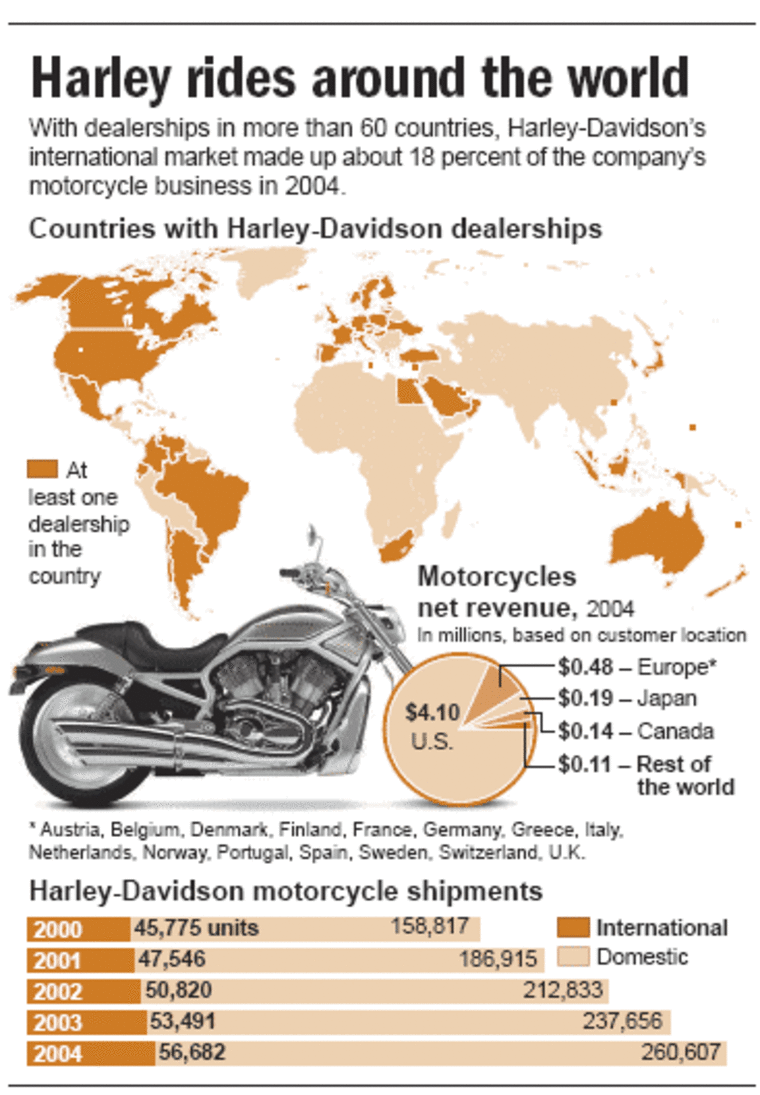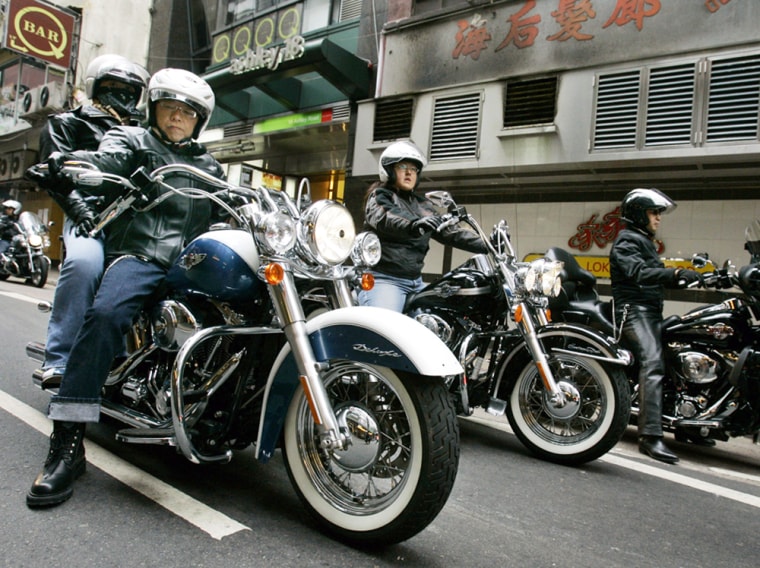For Ray Ma, freedom on the open road means riding his Harley-Davidson motorcycle behind two police cars through the Chinese countryside.
The 53-year-old Hong Kong dental surgeon and members of his 35-bike riding group had to pay 10,000 Hong Kong dollars ($1,290) per bike in escort and paperwork fees last fall to make their trip to Guilin city a reality.
"We have to follow the rules in the place where they have the rules," Ma said. "And I regard that as free."
But Ma said he yearns for the day when he can escape the cramped city for the Chinese mainland without the hassle.
"We really hope that we can ride through the border like anywhere else, like in the States or Canada, or Europe," said Ma. "So that we can just plan a weekend trip, three days and two nights in China. That is really the best for a Hong Kong rider."
For years, iconic motorcycle maker Harley-Davidson Inc. has pushed hard to find ways to sell its motorcycles in China. Now, the Milwaukee-based company says it plans to announce before summer that it will open its first retail outlet in the country since at least World War II.
"Mao said that a thousand-mile journey begins with the first step," said Timothy Hoelter, Harley-Davidson's vice president of government affairs. "I guess we're taking some baby steps already."
The company says there are still major hurdles — some 170 Chinese cities limit or ban motorcycle use or ownership, largely because they are viewed as underpowered, cheap, polluting machines that clog traffic and endanger others.

"We are not encouraging motorcycle use," said Miss Huang, who only gave her surname, a spokeswoman for the police force's Shanghai Public Security Policy Consultation Office.
Motorcycles have been banned from almost all the main streets in Shanghai, Huang said, and the city stopped accepting motorcycle registrations in 2002.
After China joined the World Trade Organization in 2001, import restrictions, quotas and tariffs dropped substantially against foreign motorcycle manufacturers, but municipal traffic ordinances have remained, Hoelter said.
"The problem is although we can now sell our motorcycles in China, the Chinese can't use them, at least if you live in an urban area," he said.
Foreign manufacturing advocates say the policy, while somewhat justified by safety concerns, has created an unfair barrier to access.
Harley-Davidson estimates small Chinese manufacturers build some 17 million motorcycles a year — most for domestic consumption — but most are small and used in rural areas, so they evade many of the restrictions on Harley-style heavyweight bikes. Other bikes such as 1950s-era Chang Jiang 750, which are still used by the Chinese government, are considered three-wheelers because of a sidecar, Hoelter said.
In contrast, BMW, which entered the Chinese motorcycle market in April 2003, said it sold only 70 bikes on the mainland last year.
The main barriers the German company has faced are riding bans in big cities and motorways, high customs duties, poor insurance coverage and the huge gap between legally sold and illegally imported motorcycles, said Stefanie Lowenstein, spokeswoman for the BMW Group.
Liu Xintong, secretary-general of China Motorcycle Industry Association, said the result is that pent-up demand for large motorcycles is going unfulfilled.
"Motorcycle riding fans are still eager to get top machines like Harley-Davidsons," he said. "But the government policy seems not motorcycle-friendly at all."
Alan Tonelson, a research fellow at the U.S. Business and Industry Council, said all U.S. manufacturers still face a "very formidable array" of barriers to gaining access to the Chinese market. "U.S. government attempts to reduce, much less eliminate, these trade barriers, has been woefully ineffective," he said.
For now, Harley-Davidson is going to drive around them.
The company's managing director for China, Dave Foley, said the company has selected a dealer and that before summer, "more specific communication will be forthcoming."
He declined to say where it would be, but noted the Beijing area had the highest concentration of riders of imported heavyweight motorcycles in the country.
Motorcycles may not be operated within Beijing's Third Ring Road, a 30-mile highway that encircles the city, so Hoelter said a likely dealer location would be outside the city core.
But the company will have to sell its products, which can exceed $20,000 retail, in a country where most Chinese make around $1,000 a year.
"The potential is enormous but it's up to us to really develop that leisure-oriented market," Foley said. The company said it was too early to forecast sales, but estimated there were more than 1,000 heavyweight motorcycle riders in China, most of whom acquired their bikes through unofficial channels.
Analyst Timothy Conder of A.G. Edwards & Sons, Inc. said it may be slow-going but Harley-Davidson should eventually win out.
"What they're selling is Americana. I think they should do well," he said.
Chen Lexing, a 37-year-old real estate worker in Guangzhou, said he and his group of Harley riders leave the city before dawn on weekend outings in Guangdong Province. They can't obtain license plates in the city of Guangzhou because their bikes are some five times the allowed engine size of 250cc.
Chen said he worries that Guangzhou will ban motorcycles altogether next year, but is hopeful at news that Harley is making inroads.
"I hope Harley-Davidson moves into China, sells more motorcycles and works with the government so that more roads and places will open up to motorcycle riders," he said.
Hoelter said the road into China will be a long one.
"China is certainly today from the market-access perspective, our most daunting challenge," he said. "It's going to be a long-term effort, it will no doubt be a multifaceted effort and we're going to have to be patient."
